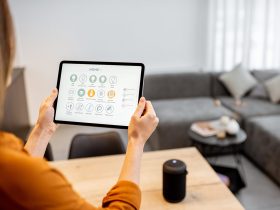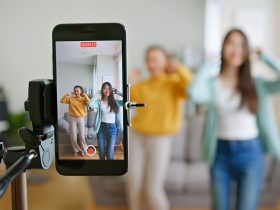Stanford Medicine, along with Fitbit and Scripps Research, has embarked on a revolutionary health mission; using data from wearable technology to detect early signs of viral infections, including COVID-19. By notating changes in heart rate, temperature, or sleep patterns, it may be possible to develop algorithms that can alert users of possible infections. Similar companies are looking at the potential wearables offer, including Oura, and early results are promising.
While the detection of viral infections using wearable technology isn’t possible just yet, the concept has brought up some concerns. How accurate will the data be? How will it be collected and stored? And how will it (and user privacy) be protected? Here’s what our research uncovered.
Benefits and privacy risks of wearable technology
It’s no secret that wearables can be used to improve health and technology like Fitbit watches offer several benefits to their users. For example, their ability to collect real-time data can assist health practitioners during exams, as being able to view such data over several days instead of what’s presenting in the office can improve the accuracy of diagnosis and treatment results. But Fitbit and other wearables come with a few potential setbacks as well.
While some concerns, like short battery life, carry few consequences, others are much more worrisome (especially when it comes to using trackers to detect infections and even future pandemics). For example, trackers have been reported to measure data inaccurately. This is concerning, especially if data is being used to help diagnose illnesses. But what’s more concerning is privacy…or a potential lack of.
For example, data can leave home addresses, real-time locations, and detailed maps of workout routes available to just about anyone who knows how to look (i.e. other users, not just hackers). But it’s a bit more serious than a friend knowing which side streets you hit on your afternoon jog. Many wearable technology companies share or sell their users’ data to third parties. Wearable companies are also vulnerable to data breaches. The 2018 Under Armour’s MyFitnessPal breach exposed 150 million users’ data, including usernames, passwords, and email addresses.
Who owns the data collected by wearable technology?
The answer to this well-deserved question depends on the maker of the wearable device in question. But in most cases, it’s not the consumer. As an example, let’s look at Fitbit, which was recently bought by Google for $2.1 billion. Concern from the public was immediate and Fitbit was quick to let their users know that their policies on privacy and security wouldn’t change.
But there’s no getting around the fact that by purchasing Fitbit, Google was gaining access to millions of users’ data. While Google has said they will not use Fitbit data for ads, there are still ways they can capitalize on personal information. As an example, health data can be sold to pharmaceutical companies in an effort to help them properly invest resources or determine which drugs to market to certain demographics.
Concerned about digital privacy?
Meet Avira Free Security Suite - everything you need for a secure and private digital life - for free
How to protect your privacy when using wearables
While Europe’s General Data Protection Regulation (GDPR) and the California Consumer Privacy Act (CCPA) offer some guidance and protection for users of wearables, there are no baseline laws for the majority of consumers to fall back on. This leaves them vulnerable to not just breaches but the potential side effects of sold data. The good news is, there are several options for staying private when using wearable technology. Consider any of the following suggestions.
Read the privacy policy
This will tell you everything you need to know about intentions related to your data. If you find that it’s vague, you can assume that any and all data can and will be shared with third parties. If you’re not comfortable with anything presented in the privacy policy, you should consider another device and/or provider. But if you’re set on a certain company, see if there’s an arbitration clause you can opt out of, which will give you back some legal control over your data.
Turn off location tracking
If your data is sold, you may be more easily identified through location tracking data. In your device’s and app’s settings, turn off location tracking (or at least require your approval before such data is collected) to create anonymity.
Limit collected data
What is your main reason for wearing a Fitbit or other tracker? If you only want to count your steps, you don’t need to have data collected on your heart rate as well. If you have no interest in specific data categories, adjust your device’s settings accordingly.
Fitbit and the future
There’s no denying the health benefits wearable technology can bring. And it’s exciting to think that one day, these devices may be able to help us detect and slow the spread of serious viral infections, saving countless lives in the process. But before celebrating such an advancement in health technology, we need to take a step back and make sure users understand privacy risks and ways to protect their data. Otherwise, we could be giving up more than we’re getting back.














